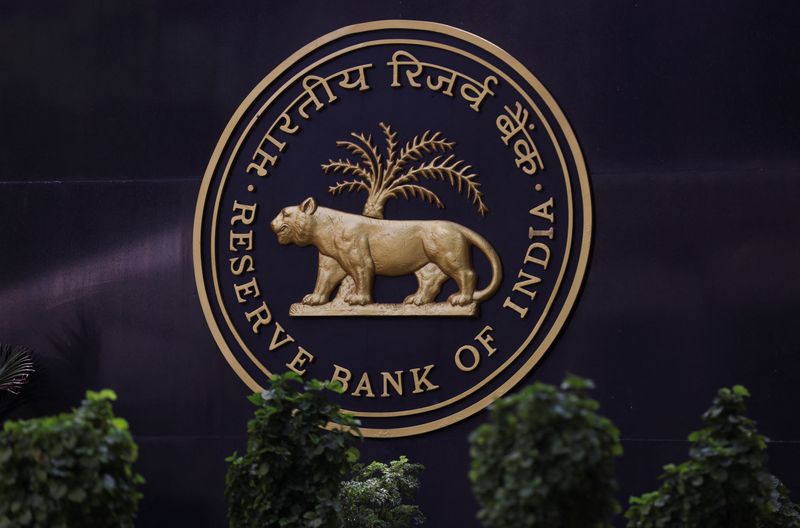By Aftab Ahmed and Swati Bhat
NEW DELHI/MUMBAI (Reuters) - India's central bank is under increasing political pressure to cut interest rates as soon as this week, after data showed growth was much weaker than expected, but its firm focus on getting inflation down means it is unlikely to do so.
Growth in Asia's third-largest economy hit a seven-quarter low of 5.4% in the July-September period, data showed on Friday, as manufacturing and consumption softened.
The bad numbers follow recent calls from ministers for the Reserve Bank of India (RBI) to cut rates and, according to some economists, strengthen prospects for a near-term cut.
For now, however, the RBI is unlikely to be swayed by the data, arguing instead that the economic weakness is a product of stubborn inflation, which remains its current priority, putting it increasingly at odds with government officials more concerned about growth.
"Elevated inflation makes a December rate cut unlikely, but there could be an explicit acknowledgement that growth needs support too," Citi's Chief Economist Samiran Chakraborty said in a note.
The central bank could consider a cut in the cash reserve ratio in December as a step toward easing, he added, though it is expected to keep rates on hold for an 11th straight meeting this week.
ANZ and IDFC First Bank (NASDAQ:FRBA) said a 25-basis-point cut in rates this week could not be ruled out, however.
India's benchmark 10-year bond yield fell 9 basis points to 6.71% after the data, while one-year and five-year overnight index swap rates, one of the best indicators to gauge policy expectations, have eased nearly 20 basis points.
Finance Minister Nirmala Sitharaman and Trade Minister Piyush Goyal have publicly called for lower interest rates in recent weeks.
"High interest rates for a long time are hurting consumption and investments," said a government official, who spoke on condition of anonymity. "The RBI should take steps to lower rates in the next policy."
The bank should focus on growth while the government would take supply-side measures to ease food prices in coming months, he added.
With inflation driven by a few food items, the central bank should now consider reducing interest rates, added another government source, also speaking on condition of anonymity.
But the central bank sees the weaker growth as a consequence of high inflation, and believes a rate cut is not warranted, said a person familiar with its thinking.
"The RBI has to go by what the Act says. The Act asks RBI to put price stability right on top and then look at growth," said the person, who spoke on condition of anonymity.
The RBI is mandated to keep inflation in a band of 2% to 6%, with a medium-term target of bringing it down to 4%. Inflation rose to 6.2% in October, the latest data shows, with food inflation running at 10.9%.
INFLATION DEBATE
At the centre of the debate on interest rates is the divergence between headline and core inflation.
Core inflation, seen as a more accurate reflection of demand since it excludes volatile food and energy prices, has averaged 3.3% between April to October 2024, compared to 4.9% in the same period in 2023.
But headline inflation has been fuelled by volatility in food prices.
"Supply disruptions from heavy rains in major producing states contributed to price pressures in tomatoes, onions, and potatoes, while elevated global prices drove up oil and fat inflation," the finance ministry said.
"A bumper kharif harvest is expected to lower food inflation in the coming months," it added in its latest economic review, referring to summer-sown crops.
The central bank fears an extended bout of higher food prices will spill into broader inflationary pressures.
"The second-round effects are already being seen. The food inflation has now seeped into processed foods," said the person familiar with the central bank's thinking.
"We are now in a low-growth, high-inflation syndrome, which the RBI was desperately trying to avoid."
In its review this week, the bank is expected to pare its forecast for growth of 7.2% for the current financial year.

This is an admission of monetary policy being too tight for too long, said another official familiar with the government's thinking.
For its part, the government, facing criticism for a high tax burden on middle class consumers, may take steps to boost consumption in the next budget in February, another official said, as it weighs tax relief for salaried individuals.